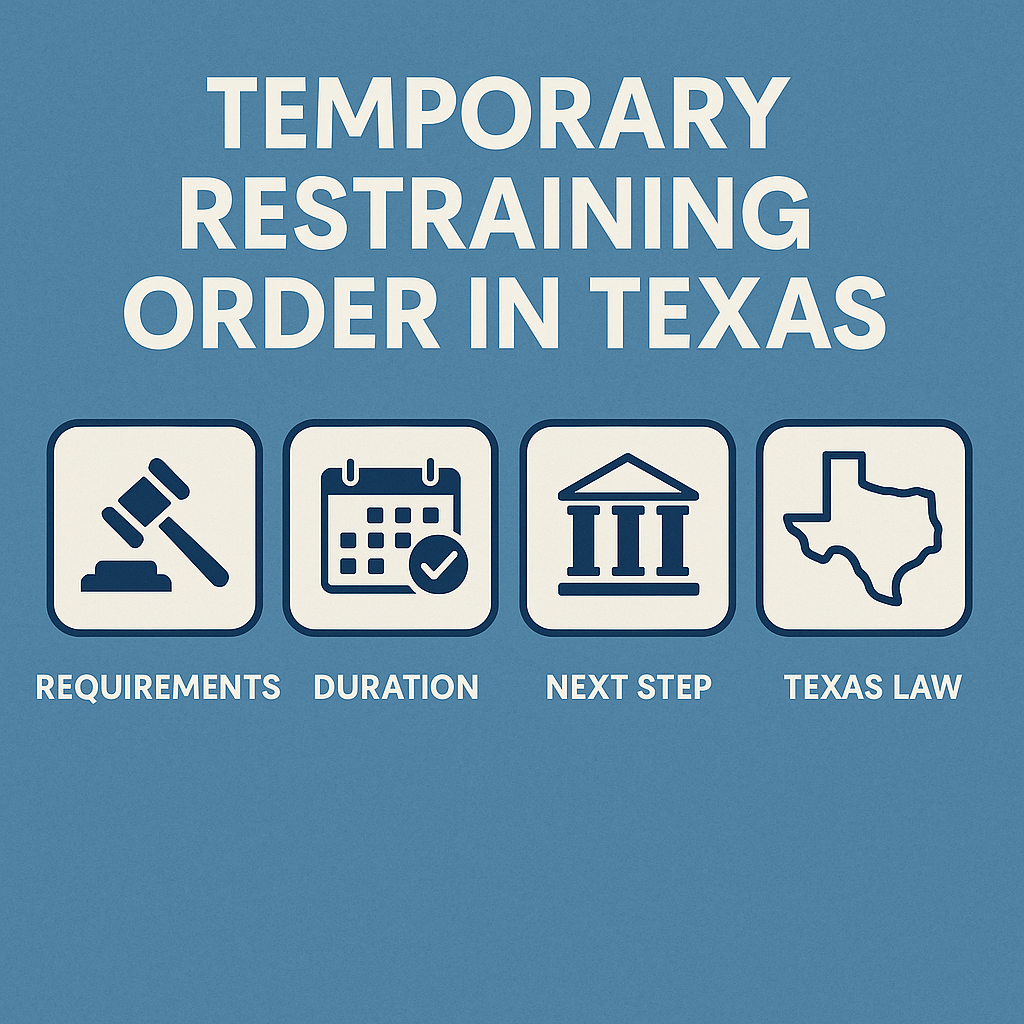
A Texas TRO is an emergency court order that preserves the status quo and prevents immediate harm until the court can hold a prompt hearing on a request for a temporary injunction. Judges may issue TROs without advance notice to the other side (ex parte) only when specific facts show “immediate and irreparable injury” will occur before a hearing can be held.
When Is a TRO Appropriate?
A TRO is appropriate when you need short-term relief to stop actions that would cause harm that money damages can’t fix (e.g., misuse of trade secrets, interfering with property, or conduct that would render a future judgment ineffective). Texas statutes recognize injunction relief generally when restraint is necessary to protect rights or keep a case meaningful.
In family cases, TROs also help protect property and children pending temporary-orders hearings; some family-law TROs have tailored rules described below.
What Do You Have to Show to Get a TRO?
1) Sworn facts. You must file a verified petition or affidavit laying out specific facts that show immediate and irreparable harm if the court waits for notice and a hearing.
2) Order content that complies with Rule 683. Any TRO must:
● state the reasons it is issued,
● be specific in terms, and
● describe in reasonable detail (not by reference to another document) the acts restrained.
It binds the parties and those acting with them who receive actual notice.
3) Security (bond). Courts must set security the applicant posts to cover damages if the order was wrongfully issued (there are limited exceptions—e.g., some public entities).
4) Prompt hearing setting. If a TRO is granted, the court must set the accompanying application for temporary injunction for the earliest possible hearing; the TRO takes precedence over most matters of the same kind.
How Long Does a TRO Last?
By rule, a TRO expires no later than 14 days after entry unless the court, for good cause, extends it once for up to another 14 days—or the restrained party consents to a longer period. The order must show the date and time it was issued.
(Helpful plain-English overview: TexasLawHelp likewise notes a 14-day outer limit, or until the temporary-orders/temporary-injunction hearing occurs.)
What Happens Next?
Temporary-Injunction Hearing. The court hears evidence (with both sides present) and decides whether to convert the short-term TRO into a temporary injunction that remains in place until trial. A temporary injunction also must meet Rule 683’s specificity requirements and include a trial-on-the-merits setting.
Motion to Dissolve or Modify. The restrained party can move to dissolve or modify—typically on two days’ notice to the applicant— and the court must hear it promptly. (This timeline echoes the Texas rules’ approach to prompt dissolution hearings for ex parte restraints.)
Service & Enforcement. The order must be served; those with actual notice who violate it may face contempt. Texas rules govern issuance and service of injunction orders.
Special Rules in Family Cases
Texas Family Code provisions authorize TROs in divorce/SAPCR matters to protect property and children. Notably, for certain SAPCR temporary orders, the Legislature relaxes Rule 683’s form requirements (e.g., such a TRO/temporary injunction under §105.001 need notdefine the injury or state why it’s irreparable or why it issued without notice). Always check the exact Family Code section that applies to your case.
Practice Pointers (Texas-Specific)
● Get specific. Conclusory or overly broad restraints are vulnerable. Spell out the precise acts to be stopped.
● Mind the clock. Calendar the 14-day expiration and the temporary-injunction setting the moment your TRO is signed.
● Prepare for bond. Be ready to argue the right bond amount (or an applicable exception).
● Consider alternatives. In family-violence situations, a protective order may be the better, broader remedy; TROs and protective orders are different tools.
Bottom Line
A Texas TRO is emergency, short-fuse relief designed to stop irreparable harm nowand bridge you to a prompt, noticed hearing on a temporary injunction. Success turns on sworn, specific facts, a properly drafted order, a bond, and moving the case quickly to the next hearing.
At David C. Barsalou, Attorney at Law, PLLC, we help clients navigate business, family, tax, estate planning, and real estate matters ranging from document drafting to litigation with clarity and confidence. If you’d like guidance on your situation, schedule a consultation today. Call us at (713) 397-4678, email barsalou.law@gmail.com, or reach us through our Contact Page. We’re here to help you take the next step.